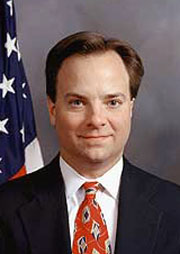
|
May 21, 2007 |
Frontiers of Health Care Conference
The Promise and Policy Implications of Personalized Medicine
Personalized medicine, which uses individual genetic information to prevent, diagnose or treat disease, will be the topic of a June 4, 2007, conference sponsored by the Division of Biology and Medicine at Brown University, Rep. Patrick J. Kennedy (D-RI), and Lifespan. The conference will feature a keynote address by genomics pioneer Francis S. Collins. | |||
|
Brown University Home |
PROVIDENCE, R.I. [Brown University] — Experts from around the region and across the country will explore the future of personalized medicine, a fast-growing force in health care, at a conference held at Brown University on Monday, June 4, 2007. The event, to be held in the Salomon Center for Teaching, is free and open to the public. Personalized medicine applies the new tools of genetic analysis directly to the prevention, diagnosis and treatment of disease. By understanding a person’s individual genetic blueprint, or knowing, across large groups of people, which genes contribute to disease, researchers are devising new drugs and diagnostic tests to achieve the best medical outcomes for patients. Along with saving or lengthening lives, advocates believe that personalized medicine has the potential to improve clinical trials and drug discovery as well as reduce health care costs.  Human genomics pioneer The conference, titled “Frontiers of Health Care: The Personalized Medicine Revolution,” will feature keynote addresses from human genomics pioneer Francis S. Collins, M.D., and health policy expert Mark B. McClellan, M.D. Sponsored by the Division of Biology and Medicine at Brown University, the office of Rep. Patrick J. Kennedy (D-RI), and Lifespan, the event is the fourth in a series of annual “Frontiers of Health Care” conferences organized and hosted by Kennedy and Brown. “Personalized medicine was a compelling choice for this year’s conference,” said Eli Y. Adashi, M.D., Brown’s dean of medicine and biological sciences. “The signs of this transformation in health care are increasingly apparent, from the growing use of genetic testing to the discovery of diathesis markers for heart disease and diabetes. The conference will explore the profound implications of personalized medicine for the public, physicians and policy-makers.” “There is great hope that personalized medicine will allow both physicians and patients to tailor their health care in the future to prevent and treat common diseases," said Kennedy. "Understanding the genetic basis of a disease and then applying it to a patient's genome to determine the best approach for treatment is exciting and complex. The goal of the 2007 Frontiers conference is to spur public and private debate in an effort to prepare for the personalized medicine revolution.” The conference will be held at the Salomon Center for Teaching, located on The College Green, and runs from 8 a.m. to 4 p.m. After a continental breakfast and opening remarks from Adashi and Kennedy, Francis S. Collins, M.D., will deliver the opening keynote speech. Collins is director of the National Human Genome Research Institute at the National Institutes of Health and best known for his leadership of the Human Genome Project, which sequenced all 3 billion base pairs in the human genome and is widely considered the most significant scientific undertaking of our time. A physician-geneticist, Collins is a major proponent of personalized medicine.  Prevention-oriented care Mark B. McClellan, M.D., will deliver the closing keynote address. McClellan is a former administrator of the Centers for Medicare and Medicaid Services and a former commissioner of the U.S. Food and Drug Administration. In the Bush administration, McClellan served as a member of the President’s Council of Economic Advisers and as senior director for health care policy at the White House. An influential supporter of prevention-oriented care, he is currently a visiting senior fellow at the AEI–Brookings Joint Center for Regulatory Studies in Washington, D.C. At the heart of the conference is a roundtable discussion. Moderated by Harvard Law School Professor Charles R. Nesson, the session will consist of interactive, role-playing exercises intended to spark dialogue about the implementation of personalized medicine as well as the public policy implications of this evolving area of medicine, including legal, economic, scientific and political considerations as well as privacy and ethical issues. The panel includes:
Registration is required and space is limited. For enrollment details and a complete agenda, visit http://bms.brown.edu/news/fhc Media should register in advance by sending an e-mail to [email protected] or calling
Editors: Brown University has a fiber link television studio available for domestic and international live and taped interviews and maintains an ISDN line for radio interviews. For more information, call the Office of Media Relations at (401) 863-2476. ###### | |||